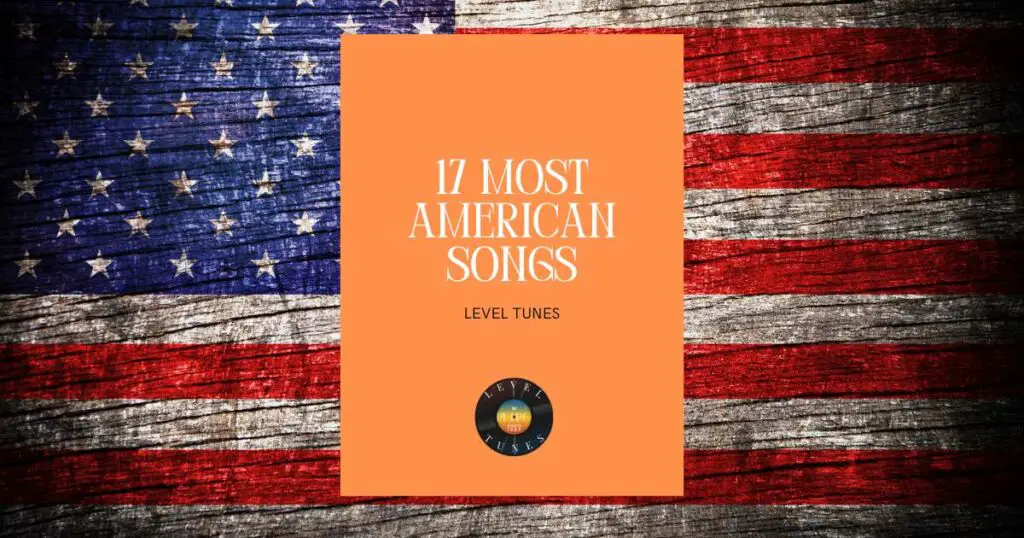17 Most American Songs: 17 Iconic Tracks
Hey there, music lovers and fellow DJs! It’s TBone here from Level Tunes, and today I’m super excited to share something special with you. I’ve been digging deep into the heart of American music and have put together a list of the 17 most quintessentially American songs.
Why 17, you ask?
Well, it’s a mix of classic hits and hidden gems that truly capture the diverse spirit of America.
From the soulful blues to the upbeat rhythms of pop, these tracks are not just songs; they’re stories that reflect the rich tapestry of American culture.
Whether you’re spinning at a club or just chilling at home, these tunes are guaranteed to add some authentic American flavor to your playlist. So, let’s dive into this musical journey across the States!
Here are the most American songs that you can check out:
List Of Most American Songs
Most American songs in a list format:
1. “Born in the U.S.A.” by Bruce Springsteen
Album: Born in the U.S.A. (1984) Label: Columbia Records
Bruce Springsteen’s “Born in the U.S.A.” is an iconic anthem that captures the essence of American life, especially for the working class. Released in 1984 as part of the album with the same name, this song is often mistaken for a patriotic celebration. However, it’s actually a critique of the treatment of Vietnam veterans, embodying the struggles and disillusionment faced by many Americans. Springsteen’s raspy voice, coupled with the E Street Band’s powerful rock sound, makes this a timeless classic that resonates with listeners even today.
2. “This Land is Your Land” by Woody Guthrie
Album: Dust Bowl Ballads (1940) Label: Victor Records
Woody Guthrie’s “This Land is Your Land” is a folk masterpiece that has become an unofficial American anthem. Written in 1940 and released on the album “Dust Bowl Ballads,” this song was Guthrie’s response to Irving Berlin’s “God Bless America.” It celebrates America’s natural beauty and the idea of shared ownership and belonging, making it a staple in American folklore. Guthrie’s simple yet profound lyrics and melody have inspired generations, making it a symbol of unity and inclusivity in the American spirit.
3. “Respect” by Aretha Franklin
Album: I Never Loved a Man the Way I Love You (1967) Label: Atlantic Records
Aretha Franklin’s “Respect” is more than just a song; it’s an anthem of empowerment and a significant symbol in the civil rights and feminist movements. Released in 1967 on the album “I Never Loved a Man the Way I Love You,” Franklin’s version (originally written and recorded by Otis Redding) transformed the song with her powerful voice and added the famous “R-E-S-P-E-C-T” chorus. This song not only showcases Franklin’s incredible talent but also reflects the ongoing struggle for equality and respect in America.
4. “Hotel California” by The Eagles
Album: Hotel California (1976) Label: Asylum Records
The Eagles’ “Hotel California” is a rock epic that encapsulates the allure and the dark side of the American dream. Released in 1976 as the title track of their album, this song features haunting lyrics and one of the most memorable guitar solos in rock history. The song’s narrative, which some interpret as an allegory about hedonism and self-destruction in Hollywood, showcases the Eagles’ storytelling prowess and their ability to capture the complexities of American culture.
5. “Sweet Home Alabama” by Lynyrd Skynyrd
Album: Second Helping (1974) Label: MCA Records
Lynyrd Skynyrd’s “Sweet Home Alabama” is a Southern rock anthem that celebrates the cultural identity of the American South. Released in 1974 on their album “Second Helping,” this song is known for its catchy guitar riff and chorus. It’s a response to Neil Young’s songs “Southern Man” and “Alabama,” which criticized the South’s history of slavery and racism. “Sweet Home Alabama” is a complex interplay of regional pride and historical context, making it a significant piece in the tapestry of American music.
6. “American Pie” by Don McLean
Album: American Pie (1971) Label: United Artists Records
Don McLean’s “American Pie” is a lyrical journey through American cultural and political history. Released in 1971 on the album of the same name, this song is famous for its abstract storytelling and length, running over eight minutes. It starts with the tragic plane crash that killed Buddy Holly, Ritchie Valens, and J.P. “The Big Bopper” Richardson, referred to as “The Day the Music Died.” McLean’s narrative weaves through the 1960s, reflecting on the loss of innocence and the changes in American society. It’s a song that invites endless interpretation and symbolizes the complexity of American history.
7. “Like a Rolling Stone” by Bob Dylan (Continued)
tale of a fall from grace, encapsulating themes of freedom, alienation, and identity. Dylan’s raw emotion and lyrical genius make this song a cornerstone of American music, reflecting the cultural and social upheavals of the 1960s.
8. “Purple Haze” by Jimi Hendrix
Album: Are You Experienced (1967) Label: Track Records Jimi Hendrix’s “Purple Haze” is a psychedelic rock masterpiece that showcases his revolutionary guitar techniques and unique sound. Released in 1967 on the album “Are You Experienced,” this song is a vivid representation of the psychedelic era in America. With its innovative use of guitar effects and Hendrix’s powerful vocals, “Purple Haze” is a symbol of musical innovation and the counterculture movement of the 1960s, embodying the spirit of experimentation and freedom.
9. “Imagine” by John Lennon
Album: Imagine (1971) Label: Apple Records John Lennon’s “Imagine” is a timeless song that has become an anthem for peace and unity. Released in 1971 on the album of the same name, this song’s simple yet profound lyrics envision a world without borders, religions, or possessions. Lennon’s message of hope and his dream for a better world resonate deeply with American ideals of freedom and equality. “Imagine” transcends music, becoming a universal message of peace and a reflection of America’s role in aspiring for a harmonious global community.
10. “What’s Going On” by Marvin Gaye
Album: What’s Going On (1971) Label: Tamla Marvin Gaye’s “What’s Going On” is a soulful masterpiece that addresses social issues and calls for understanding and compassion. Released in 1971 on the album with the same name, this song was a departure from Gaye’s previous work, focusing on themes like poverty, drug abuse, and the Vietnam War. Its smooth melody, layered vocals, and poignant lyrics make it a powerful commentary on the state of America, reflecting the country’s struggles and the universal desire for peace and equality.
11. “Billie Jean” by Michael Jackson
Album: Thriller (1982) Label: Epic Records Michael Jackson’s “Billie Jean” is a groundbreaking track that combines a compelling narrative with an irresistible groove. Released in 1982 on the album “Thriller,” this song is known for its distinctive bassline, Jackson’s signature vocal style, and the famous moonwalk in its music video. “Billie Jean” not only showcases Jackson’s immense talent but also reflects the fusion of pop, dance, and R&B that characterizes American music. It’s a testament to Jackson’s influence on popular culture and the global impact of American music.
12. “Take Me Home, Country Roads” by John Denver
Album: Poems, Prayers & Promises (1971) Label: RCA Records John Denver’s “Take Me Home, Country Roads” is a beloved country-folk song that celebrates rural America. Released in 1971 on the album “Poems, Prayers & Promises,” this song’s warm, inviting melody and nostalgic lyrics evoke images of the scenic landscapes and simple life of the countryside. Denver’s heartfelt performance and the song’s portrayal of West Virginia as a symbol of comfort and home resonate with many Americans, making it an enduring classic in American music.
13. “The Times They Are a-Changin'” by Bob Dylan
Album: The Times They Are a-Changin’ (1964) Label: Columbia Records Bob Dylan’s “The Times They Are a-Changin'” is a powerful folk anthem that became a rallying cry for change during the 1960s. Released in 1964 on the album of the same name, this song’s poignant lyrics and simple acoustic arrangement capture the spirit of social and political upheaval. Dylan’s call for awareness and action in the face of change reflects the transformative period in American history and the enduring desire for progress and justice.
14. “Smells Like Teen Spirit” by Nirvana
Album: Nevermind (1991) Label: DGC Records Nirvana’s “Smells Like Teen Spirit” is a grunge anthem that defined a generation and marked a significant shift in the music landscape. Released in 1991 on the album “Nevermind,” this song’s raw energy, angst-filled lyrics, and Kurt Cobain’s distinctive voice captured the disillusionment and rebellious spirit of American youth. It’s a cultural milestone that represents the rise of alternative rock and the changing face of American music in the early 1990s.
15. “I Will Always Love You” by Whitney Houston
Album: The Bodyguard: Original Soundtrack Album (1992) Label: Arista Records Whitney Houston’s rendition of “I Will Always Love You” is a breathtaking showcase of her vocal prowess and emotional depth. Originally written and recorded by Dolly Parton, Houston’s version was released in 1992 as part of “The Bodyguard” soundtrack. Her powerful and emotive performance transformed the song into a monumental ballad, reflecting the depth of American soul and R&B. It’s a testament to Houston’s talent and the enduring appeal of love songs in American music.
16. “Fight the Power” by Public Enemy
Album: Fear of a Black Planet (1990) Label: Def Jam Recordings Public Enemy’s “Fight the Power” is a hard-hitting hip-hop track that confronts racial injustice and calls for empowerment. Released in 1990 on the album “Fear of a Black Planet,” this song’s aggressive beats, Chuck D’s forceful lyrics, and Flavor Flav’s dynamic presence make it a powerful statement against oppression. It’s a reflection of the social and political issues in America and the role of hip-hop as a voice for the marginalized and a force for change.
17. “Born to Run” by Bruce Springsteen
Album: Born to Run (1975) Label: Columbia Records Bruce Springsteen’s “Born to Run” is a rock anthem that captures the yearning for freedom and escape. Released in 1975 on the album of the same name, this song’s energetic rhythm, poetic lyrics, and Springsteen’s passionate delivery embody the spirit of American rock. It’s a song about dreams, love, and the desire to break free from constraints, resonating with the universal American theme of pursuing happiness and the open road.
Fun Facts: Most American Songs
“Born in the U.S.A.” by Bruce Springsteen
- Misinterpretation: Despite its critical tone, “Born in the U.S.A.” was often misinterpreted as a patriotic anthem. Even President Ronald Reagan tried to use it for his re-election campaign, missing its true meaning about the plight of Vietnam War veterans.
- Synthesizer Introduction: The famous opening synthesizer riff was actually a fluke. It was played by E Street Band member Roy Bittan during a sound check and caught Springsteen’s attention, leading to its inclusion in the song.
“This Land is Your Land” by Woody Guthrie
- A Response to “God Bless America”: Woody Guthrie wrote “This Land is Your Land” in response to Irving Berlin’s “God Bless America,” which he felt was overly simplistic and complacent. Guthrie’s song was originally titled “God Blessed America for Me.”
- Lost Verses: The song originally had several verses that were critical of America’s private property laws and economic inequality, but these were often omitted in later recordings.
“Respect” by Aretha Franklin
- A Cover That Outshone the Original: Aretha Franklin’s version of “Respect” was actually a cover of Otis Redding’s song. Her rendition became so popular that it overshadowed the original and became an anthem for civil rights and feminist movements.
- Saxophone Solo: The saxophone solo in the song was played by King Curtis, who was one of the most respected session musicians of his time.
“Hotel California” by The Eagles
- Multiple Interpretations: “Hotel California” has been subject to various interpretations, including references to hedonism, the music industry, and even satanism. However, the band has stated that it’s more about the “high life” in Los Angeles.
- A Guitar Duel: The song’s extended guitar solo is a duet between Don Felder and Joe Walsh, showcasing a remarkable interplay between the two guitarists.
“American Pie” by Don McLean
- The Day the Music Died: The song commemorates February 3, 1959, when Buddy Holly, Ritchie Valens, and J.P. “The Big Bopper” Richardson died in a plane crash. This event is referred to as “The Day the Music Died.”
- A Lengthy Hit: At over 8 minutes long, “American Pie” was one of the longest songs to gain widespread popularity on radio.
“Like a Rolling Stone” by Bob Dylan
- A Revolutionary Sound: When Dylan released “Like a Rolling Stone,” its electric sound was a radical departure from his folk roots, shocking many of his fans.
- Highly Praised Lyrics: The song’s lyrics have been widely praised for their complexity and were a significant factor in Dylan being awarded the Nobel Prize in Literature in 2016.
“Purple Haze” by Jimi Hendrix
- Dream Inspiration: Jimi Hendrix claimed that the song was inspired by a dream in which he was walking under the sea.
- Guitar Effects: “Purple Haze” was one of the first songs to use the “Octavia” guitar effects pedal, which creates an octave doubling sound, contributing to its distinctive sound.
“Imagine” by John Lennon
- Yoko Ono’s Influence: The lyrics of “Imagine” were inspired by Yoko Ono’s book “Grapefruit.” In 2017, Ono received co-writing credit for the song.
- A Universal Anthem: “Imagine” has been recognized as a global peace anthem and was played at the opening ceremony of the 2012 Summer Olympics in London.
“What’s Going On” by Marvin Gaye
- Inspired by Police Brutality: The song was inspired by Renaldo “Obie” Benson witnessing police brutality and violence at an anti-war protest in Berkeley, California.
- A Departure from Motown’s Formula: “What’s Going On” was a significant departure from the Motown Sound, incorporating social commentary and a more personal style, which was initially resisted by Motown founder Berry Gordy.
And there you have it, folks! A journey through the heart of American music with some of the most iconic songs ever created. Each track tells a unique story, reflecting the diverse and dynamic spirit of America. Keep these tunes close, and let the music play on!
Thanks for reading.
TBone




